Why small mistakes after a crash cost riders big
When you’re a biker, you learn to shake things off. A close call… a little road rash… a low‑speed dump. Most of us have shrugged off worse.
The reality is, after a motorcycle crash, the smallest mistake can snowball into a nightmare with insurance companies, medical bills, and your right to compensation.
After more than 40 years of representing injured bikers, we’ve seen just how dangerous this can be.
In this article, we’ll break down the most common mistakes riders make after a wreck, why they hurt your case, and how you can avoid them so you don’t get taken advantage of when you’re most vulnerable.
We’ll kick off listing the mistakes in a minute but first, here are a few frequently asked questions you may want to know about:
FAQ: Common Questions Riders Ask After a Motorcycle Accident
Below are some of the questions we hear most often from riders after a crash. These quick answers help clear up confusion and give you a solid starting point.
Do I really need to call the police if the crash seems minor?
Yes. Even low‑speed crashes can cause hidden injuries and costly damage. Without a police report, it becomes your word against the other driver’s.
What if I didn’t feel pain on the day of the crash?
That’s extremely common. Adrenaline masks injuries. Get checked by a doctor the day of the crash, or the next day at the latest. Delayed treatment can hurt your health and your claim.
The driver apologized at the scene. Does that help my case?
It can, but only if it’s documented. Never rely on a verbal apology alone. Evidence and the police report matter far more.
Should I talk to the other driver’s insurance company?
No. They are trained to get you to say something they can use against you. Always talk to a motorcycle attorney first.
Can posting about my crash on Facebook hurt my case?
Absolutely. Insurance companies will search for anything they can twist. Staying offline is the safest move.
What if the crash was partly my fault?
Iowa allows you to recover compensation as long as you are not more than 50% at fault. But the insurance company will try to push blame onto you. Get legal advice early.
How long do I have to file a claim in Iowa?
You have 2 years from the date of the crash. Miss that window, and you lose your right to recover anything.
Can The Biker Lawyers help even if I wasn’t riding a big cruiser or Harley?
Of course. If it has an engine and at least two wheels, we protect the rider—no matter what you ride. Just give us a call at (319) 294-4424 for a free consultation.
Mistake #1: Not Calling 911 Because the Rider “Feels Fine”
Most riders don’t want to make a fuss. You stand up, move your arms, take a deep breath, and think, “I’m good.”
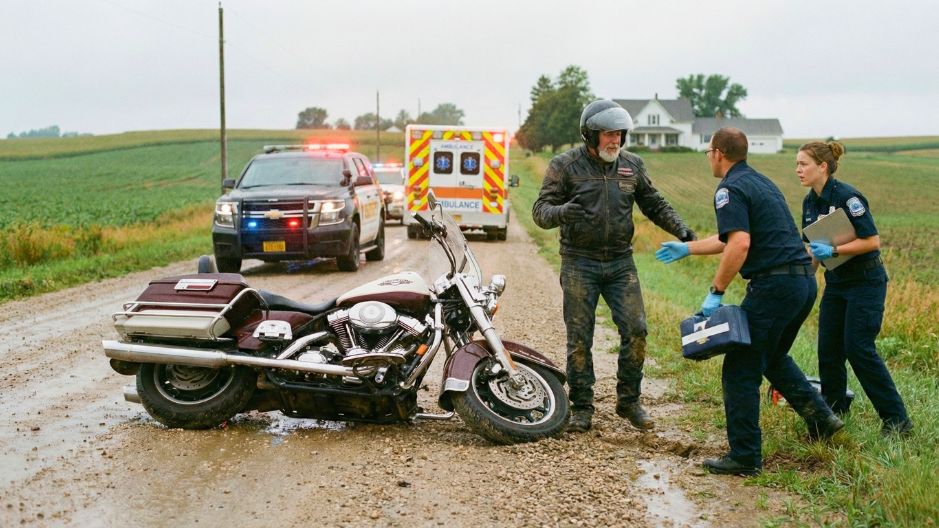
Here’s the problem: adrenaline lies. It masks pain, stiffness, and symptoms that don’t show up until hours—or days—after the crash.
Calling 911 isn’t about being dramatic. It protects you.
- A police report can help lock down the facts. Without it, the other driver can change their story later.
- Refusing medical care makes your injuries look “not serious.” Insurance companies jump all over that.
- EMS checks catch injuries you don’t feel yet. Internal injuries, concussions, and soft‑tissue trauma don’t always show right away and they can get a lot worse if you don’t catch them early.
Even if you feel fine, get checked and get the crash documented. Future‑you will thank you.
Mistake #2: Riding the Bike Home (or Getting a Ride) Instead of Documenting Everything
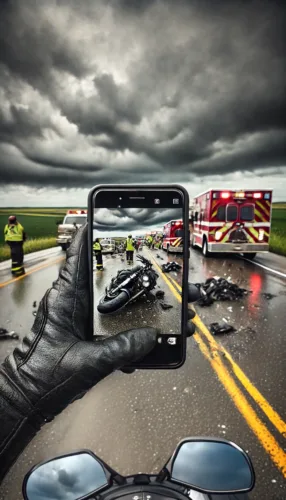 It’s natural to want to get the bike out of the road and head home. But riding off—or getting picked up—before documenting the scene is one of the most damaging mistakes a rider can make.
It’s natural to want to get the bike out of the road and head home. But riding off—or getting picked up—before documenting the scene is one of the most damaging mistakes a rider can make.
Crash scenes change fast. Cars leave. Weather shifts. Debris gets moved. Skid marks fade. And without evidence, the insurance company will argue there’s “no proof” of what really happened.
Here’s what every rider should make sure gets documented before leaving the scene:
- Photos of the vehicles from every angle
- Close‑ups of damage to your bike and the other vehicle
- Your injuries, even if minor
- Road conditions (gravel, oil, potholes, blind corners)
- Skid marks or debris fields
- Traffic signs, signals, and the intersection layout
- Witness names and phone numbers
- The other driver’s insurance and license information
If you’re too injured to gather evidence, ask a friend, a bystander, or even another biker who stops to help. One of the unwritten rules of Road Warriors: “Riders look out for each other.”
Bottom line: the more proof you capture early, the harder it is for the insurance company to twist the story later.
Mistake #3: Not Getting Checked Out by a Doctor Immediately
A lot of riders think, “If I can walk away, I’m fine.” The reality is, some of the most serious motorcycle injuries don’t show up until hours—or even days—after the crash.
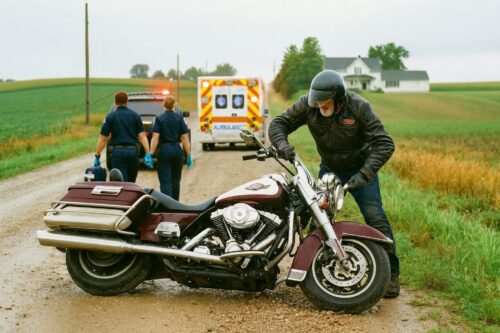
Here’s why skipping the doctor is such a costly mistake:
- Delayed‑onset injuries are extremely common. Concussions, whiplash, spinal injuries, nerve damage, and internal bleeding often start with mild symptoms… or none at all.
- Waiting to get checked creates a gap in treatment. Insurance companies love this. They’ll argue your injuries didn’t come from the crash, or that they “can’t be that serious” if you waited days to see a doctor.
- Early exams create a medical record that protects you. This is proof you were hurt, when you were hurt, and how you were hurt.
Even if you feel mostly okay, see a doctor within 24 hours. Get the exam. Get the scans. Get the documentation. Your health, and your case, depend on it.
Mistake #4: Apologizing or Admitting Fault at the Scene
We all know “Iowa Nice” is a real thing. Hell, most riders are polite by nature.
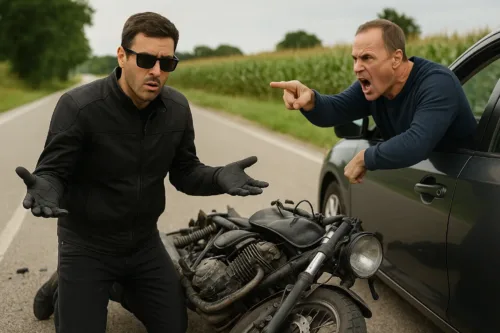
You stand up after a crash, look around, and the first thing out of your mouth is often, “Sorry, I didn’t see you,” or “My bad.” It feels natural in the moment, especially when you’re shaken up.
But here’s the truth: those words can come back to destroy your case.
Iowa uses a comparative fault system. That means if you are even partially blamed for the crash, your compensation can be reduced. In fact, if you’re found 50.1% at fault, you get nothing. You can bet your bike that if an adjuster can twist your words into an admission of fault, they absolutely will.
And remember, these days everything is recorded. Doorbell cameras, dash cams, and even bystanders with cell phones might pick up what you say.
Here’s what riders should avoid saying at the scene:
- “I’m sorry.”
- “I didn’t see you.”
- “It was my fault.”
- “I’m fine.”
Instead, stick to the basics:
- Exchange information.
- Answer police questions with clear facts.
- Get medical attention.
- Document the scene.
Let the investigation and evidence tell the story. Not your adrenaline-fueled instincts.
Mistake #5: Trusting the Other Driver’s Insurance Company
If there’s one thing riders learn the hard way, it’s this: the other driver’s insurance company is not your friend.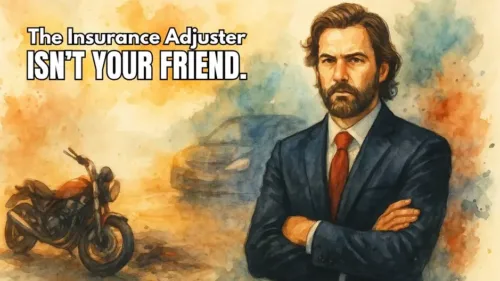
Here’s where riders get trapped:Let professionals fight for your rights with the insurance company. It’s our job to make sure you don’t get steamrolled by a system designed to underpay riders.Here’s the smarter move:
- Recorded statements. These calls are designed to get you to say something they can use against you. Even simple phrases like “I didn’t see them” or “I feel okay” can destroy your case.
- Leading questions. Adjusters often try to box you into answers that shift blame onto you.
- Quick, lowball settlement offers. They know you’re stressed and want to get your bike fixed. They swoop in early hoping you’ll take pennies before you realize the true cost of your injuries.
- Don’t give a recorded statement.
- Don’t guess, estimate, or downplay your injuries.
- Don’t sign anything until you talk to a motorcycle injury attorney.
Mistake #6: Not Notifying Your Own Insurance Company
This one surprises a lot of riders. Even when the crash is clearly the other driver’s fault, you still need to notify your insurance company.
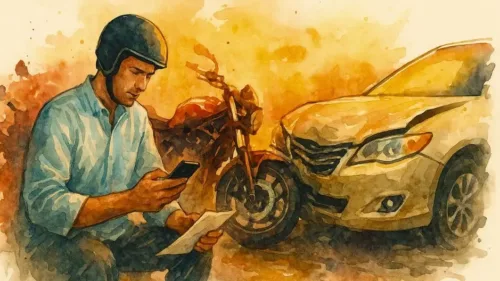
Almost every policy requires you to report any crash right away, and failing to do it can come back to bite you.
In some cases, your own insurance might actually be the one helping you more than you think.
Med‑Pay coverage, towing benefits, and uninsured or underinsured motorist coverage often come from your policy, not the other driver’s. If you wait too long, your insurance company can deny those benefits completely, simply because the crash wasn’t reported on time.
There’s another reason this step matters: more often than not, the other driver’s insurance tries to blame you. When that happens, your own company becomes your backup. They have a financial reason to prove you weren’t at fault, and they can help protect your rights.
When you call your insurer, keep it simple. Give them the basic facts: when and where the crash happened, the vehicles involved, and that you were injured. Don’t guess about speed. Don’t argue fault. Don’t describe pain levels or try to diagnose your own injuries. And whatever you do, don’t agree to a recorded statement until you’ve talked to a motorcycle attorney.
Your job here is straightforward: make the call, report the crash, and keep things factual. Let a professional deal with the rest.
Mistake #7: Posting About the Crash on Facebook, TikTok, or Other Social Media
When a crash happens, you want to update your friends, warn other riders, or vent about what went down. That instinct makes sense. But posting about the wreck online is one of the fastest ways to damage your case.
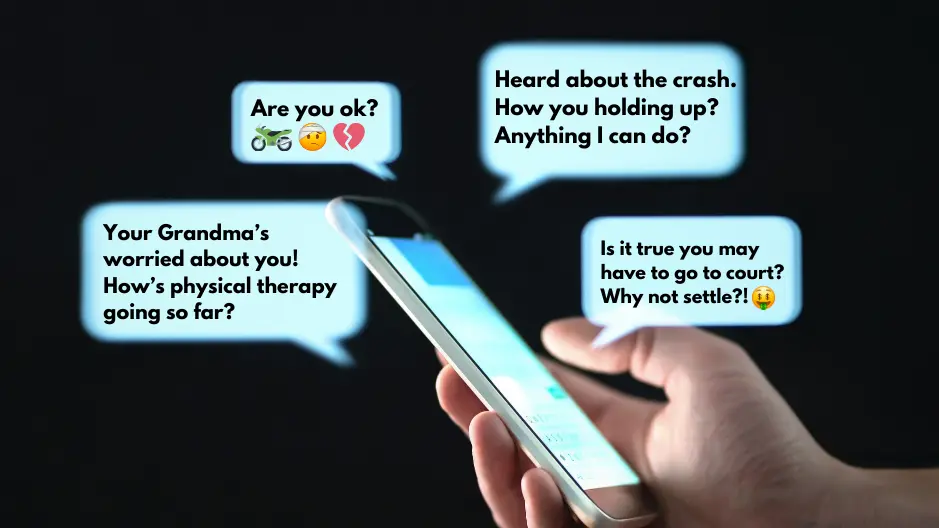
Anything you post can be taken out of context. A simple photo with the caption “I’m okay” can be twisted into “no injuries.” A joke you make to lighten the mood can be used to downplay your pain. Even comments from friends can cause problems if they suggest you were speeding, riding hard, or should go after the other guy hard.
And here’s the part most riders don’t know: nothing online is truly private. Insurance companies pull screenshots, dig through comment threads, and request access to posts. Yes, even deleted ones.
Private messages can also become not-so-private as part of an investigation.
It’s safer to go silent online until your case is done. No photos. No updates. No opinions about the crash. Save your story for your attorney, not the internet.
It’s like the old saying goes, “If they know you in real life, they’ll stop by or call.”
Mistake #8: Trying to Fix or Total the Bike Before the Case Is Evaluated
For a lot of riders, the bike isn’t “property.” It’s your pride, your therapy, your freedom machine. So when it’s damaged, the instinct is simple: fix it fast or total it out and move on.But acting too quickly can kill your case.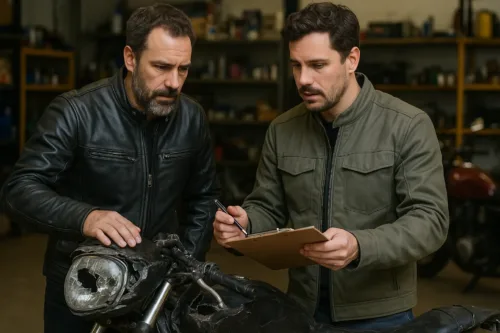
- Get an estimate, but don’t authorize repairs right away.
- Take detailed photos of every angle of the damage.
- Make sure the bike is stored somewhere safe until the legal side is sorted.
Once the evidence is documented and your attorney gives the green light, then you can decide whether to rebuild or replace. Until then, treat the bike like any other critical piece of proof. Because it is.
Mistake #9: Waiting Too Long to Talk to a Motorcycle Attorney
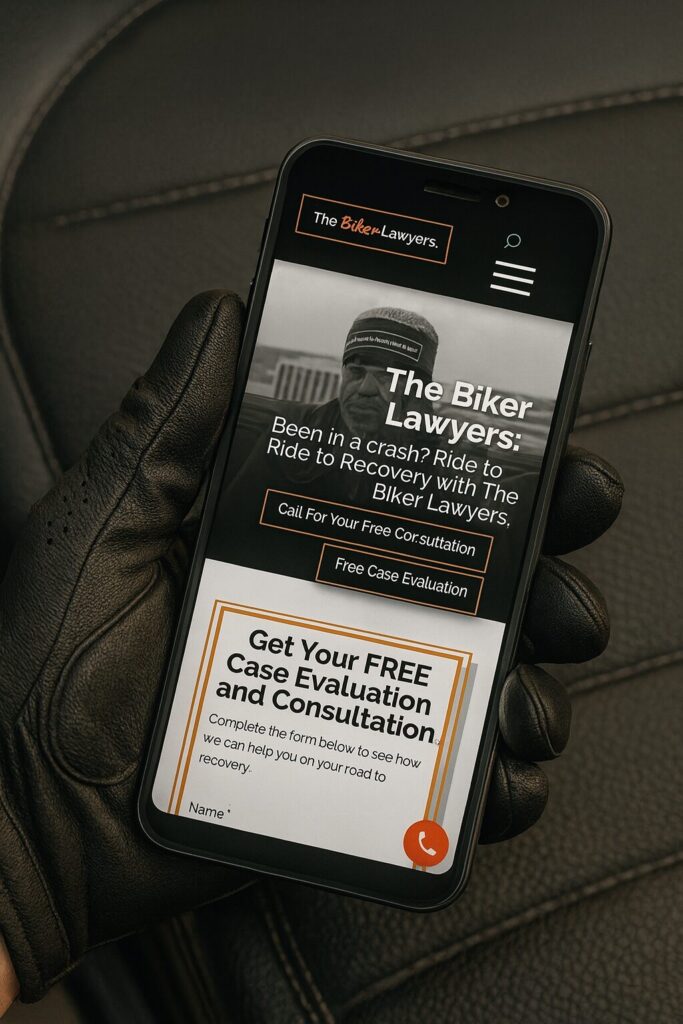
It’s a good-hearted instinct, but it can cost you big.
The longer you wait, the more evidence fades. Skid marks disappear. Vehicles get repaired. Surveillance footage gets deleted.
Even witnesses who were sure of what they saw start to forget the details. And every day that passes gives the insurance company more opportunities to build a case against you.
There are also strict legal deadlines at play. If you wait too long, you can lose your right to recover anything at all. In Iowa, the Statute of Limitations is 2 years. If you wait 2 years and 1 day, it’s too late and you’re out of luck.
Talking to a motorcycle attorney early doesn’t mean you’re suing anyone. It just means you’re protecting yourself by understanding the full scope of your situation.
A good biker-attorney can point you in the right direction, preserve evidence, deal with the insurance companies, and make sure you don’t make any mistakes that weaken your case.
In short: the sooner you get guidance, the more control you have over what happens next.
Mistake #10: Hiring a Lawyer Who Doesn’t Ride

Here’s a hard truth most riders don’t realize until it’s too late: not every attorney understands motorcycle cases, and hiring the wrong one can cost you thousands in cash left on the table. You can’t get what you don’t know to fight for.
Motorcycle crashes aren’t car crashes. The injuries are different. The road dynamics are different. The way drivers treat riders is different. And the way insurance companies fight these claims is very different.
If your lawyer doesn’t ride, they don’t understand the physics of a bike laying down, how gravel in a turn affects a line, why a “failure to yield” is one of the most common crash types, or how a driver claiming “I didn’t see them” is almost always tied to inattention, not invisibility.
A non‑rider attorney will treat your case like any other injury claim.
A Biker Lawyer knows better. We know what it feels like to be on two wheels, how quickly things can go wrong, and how devastating even a “minor” crash can be.
We also know the excuses drivers make because we’ve heard them on the road long before we heard them in a courtroom.
When the stakes are high and your future is on the line, you want someone who speaks your language, understands your lifestyle, and knows how to explain a motorcycle crash in a way a jury—and an insurance company—can’t ignore.
Bottom line: don’t trust your case to someone who’s never thrown a leg over a bike.
What Riders Should Do Instead (10 Step Guide)
After a crash, your mind is racing. You’re shaken up, maybe hurting, and trying to make sense of what just happened. That’s when riders make the most mistakes—because you’re reacting on instinct, not thinking about the legal minefield you’ve just stepped into.
Here’s the real-deal checklist for after a crash that keeps you protected both medically and legally:
- Call 911 immediately so the crash and your injuries are officially documented.
- Get checked by EMS even if you feel “mostly fine.” Adrenaline hides a lot.
- Take photos and video of everything—vehicles, damage, road conditions, skid marks, injuries, and the overall scene.
- Get the other driver’s information without apologizing, debating fault, or making small talk.
- Gather witness names and numbers before they leave.
- Get medical treatment the same day and follow all recommendations.
- Report the crash to your own insurance company but keep it factual and brief.
- Stay off social media until the case is done.
- Do not fix, repair, or move forward with totaling your bike until evidence is documented.
- Talk to a motorcycle attorney as early as possible so you don’t get blindsided by insurance traps.
Follow this list, and you’ll avoid the biggest pitfalls riders face after a wreck. It keeps you protected, preserves your rights, and sets the stage for a strong recovery—on and off the bike.
The Biker Lawyers have your back.
If you’ve been in a motorcycle crash, you don’t have to navigate this alone. At The Biker Lawyers, we’re riders first and attorneys second. We know what it feels like to hit the pavement, and we know how fast your world can flip upside down when a driver isn’t paying attention.
Here’s the good news: you don’t pay anything upfront. Your consultation is 100% free, and we only get paid if we win your case.
If you’re hurting, overwhelmed, or unsure what to do next, reach out. We’ll walk you through your options, protect your rights, and make sure the insurance company doesn’t take advantage of you while you’re vulnerable.
📞 Call us anytime at (319) 294-4424
Or if you prefer to start online, you can click below to tell us what happened, and a biker‑attorney will get back to you.
Your recovery matters. Your story matters. And your rights matter.
When the road gets rough, we’ve got your back.
Learn more: Motorcycle Accident Services


